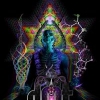I'm getting back into self hypnosis, but the main problem I have is trancing. I've tried plenty of inductions (including the elman induction), plenty of different tapes by different authors, practiced a lot, but it's always a hit or miss going into trance.
The best way I've found to trance, is do it before bed, usually when I've taken liquid magnesium. But a lot of the time I don't know whether I fell alseep, or hit a trance state and then fell asleep.
Now I don't want this thread to turn into topic of best methods to trancing/self hypnosis which aren't related to supplements. I want to focus on the biological/chemistry aspect that may help.
I know Theanine has been proven to increase alpha waves, and I think it helped in the past. But I haven't seen any other supplement which has been proven to do this.
Are there any other supplements people think would be good to help with trancing?
My current plan is to try the following supplements before doing a hypnosis session:
- Liquid Magnesium
- Passionflower
- Chamomile
- Taurine
- Theanine
I'm just waiting for them to arrive.
Other supplements which may help (which I haven't bought) are:
- Bacopa
- Lemon Balm
- Kava
I guess what I think would work, are supplements that help relax you, without making you drowsy.
Any suggestions?
Edited by manny, 08 October 2017 - 02:24 PM.
















































